This article does not cite any sources .(December 2011) (Learn how and when to remove this template message) |
These are the Canadian number-one country songs of 1981, per the RPM Country Tracks chart.
This article does not cite any sources .(December 2011) (Learn how and when to remove this template message) |
These are the Canadian number-one country songs of 1981, per the RPM Country Tracks chart.

"Crazy Little Thing Called Love" is a song by the British rock band Queen. Written by Freddie Mercury in 1979, the track is included on their 1980 album The Game, and also appears on the band's compilation album, Greatest Hits in 1981. The song peaked at number two in the UK Singles Chart in 1979, and became the group's first number-one single on the Billboard Hot 100 in the US in 1980, remaining there for four consecutive weeks. It topped the Australian ARIA Charts for seven weeks.
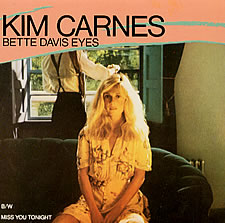
"Bette Davis Eyes" is a song written and composed by Donna Weiss and Jackie DeShannon in 1974. It was originally recorded by the latter in that year but was made popular by American singer Kim Carnes in 1981 when it spent nine non-consecutive weeks on top of the US Billboard Hot 100. The song was #1 for five weeks but was interrupted for one week by the "Stars on 45 Medley" before it returned to the top spot for another four weeks and became Billboard's biggest hit of the year. The single also reached No. 5 on Billboard's Top Tracks charts and No. 26 on the Dance charts. It was also a No. 1 hit in 21 countries and peaked at No. 10 in the United Kingdom, to date her only Top 40 hit in that country. It also reached No. 2 in Canada for twelve consecutive weeks, and was the No. 2 hit of 1981 in that country.
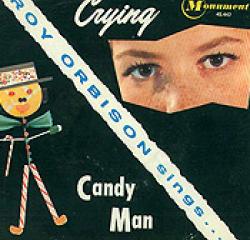
"Crying" is a song written by Roy Orbison and Joe Melson for Orbison's third studio album of the same name (1962). Released in 1961, it was a number 2 hit in the US for Orbison and was covered in 1980 by Don McLean, whose version went to number 1 in the UK.
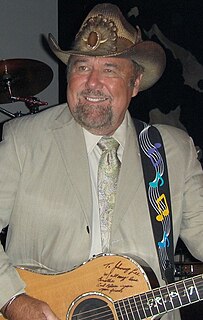
Johnny Lee is an American country music singer. His 1980 single "Lookin' for Love" became a crossover hit, spending three weeks at number 1 on the Billboard country singles chart while also appearing in the top 5 on the Billboard Hot 100 chart and top 10 on Billboard's Adult Contemporary chart. He racked up a total of 17 top 40 country hits in the early and mid-1980s.

"9 to 5" is a song written and originally performed by the American country music entertainer Dolly Parton for the 1980 comedy film of the same name. In addition to appearing on the film soundtrack, the song was the centerpiece of Parton's album 9 to 5 and Odd Jobs, released in late 1980. The song was released as a single in November 1980.
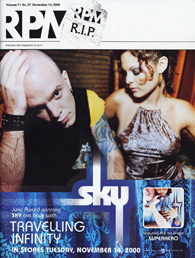
RPM was a Canadian music industry publication that featured song and album charts for Canada. The publication was founded by Walt Grealis in February 1964, supported through its existence by record label owner Stan Klees. RPM ceased publication in November 2000.

Heartbreaker is the twentieth solo studio album by American singer-songwriter Dolly Parton. It was released on July 17, 1978, by RCA Victor. The album was produced by Gary Klein and Parton with Charles Koppelman serving as executive producer, and was an even more direct aim at the pop charts, with several of its songs verging on disco. The album topped the Billboard Top Country Albums chart for nine consecutive weeks and peaked at number 27 on the Billboard 200. The album produced two number one hits on the Billboard Hot Country Songs chart, "Heartbreaker" and "I Really Got the Feeling", while "Baby I'm Burnin'" peaked at number 25 on the Billboard Hot 100. The album has been certified Gold in the United States and Canada.

"Tell It Like It Is" is a song written by George Davis and Lee Diamond and originally recorded and released in 1966 by Aaron Neville. In 2010, the song was ranked No. 391 on Rolling Stone magazine's list of The 500 Greatest Songs of All Time.
"By the Time I Get to Phoenix" is a song written by Jimmy Webb. Originally recorded by Johnny Rivers in 1965, it was covered by American country music singer Glen Campbell on his album of the same name. Released on Capitol Records in 1967, Campbell's version topped RPM's Canada Country Tracks, reached number two on Billboard's Hot Country Singles chart, and won two awards at the 10th Annual Grammys. Broadcast Music, Inc. (BMI) named it the third most performed song from 1940 to 1990. The song was ranked number 20 on BMI's Top 100 Songs of the Century. Frank Sinatra called it "the greatest torch song ever written."

"Crying in the Rain" is a song composed by Carole King with lyrics by Howard Greenfield, originally recorded by American duo the Everly Brothers. The single peaked at number six on the US Billboard Hot 100 in 1962.
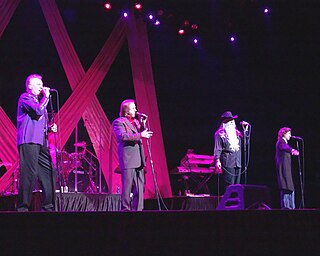
The Oak Ridge Boys is an American musical group. Originally a gospel group, The Oak Ridge Boys switched its focus to country music in the mid-1970s, releasing a string of hit albums and singles that lasted into the early 1990s. Their discography comprises thirty-one studio albums and fifty-six singles. Their highest-selling album is 1981's Fancy Free, which is certified double-platinum by the Recording Industry Association of America (RIAA).
"Who's Cheatin' Who" is a country music song written by Jerry Hayes and initially recorded by Charly McClain. It was the title track of her 1980 album for Epic Records, released in November 1980 as a single with "Love Scenes" on the B-side, and in early 1981, was her first Number One hit on the Billboard country charts. 17 years later, Alan Jackson had chart success with the song as well, with his cover version reaching Top Five on the country charts. In January 2020 the song was covered again and released as a single by the Vermont Rock and Roll band Third Shift.
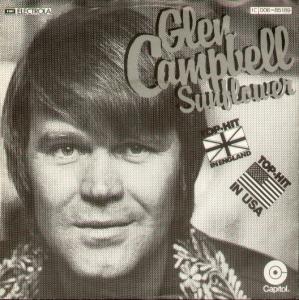
"Sunflower" is a song written by Neil Diamond and recorded by American country music singer Glen Campbell. It was released in June 1977 as the second single from Campbell's 1977 album, Southern Nights. "Sunflower" was the last of eight number ones on the Easy Listening chart for Campbell. The single spent one week at number one and peaked at number 39 on the Billboard Hot 100. "Sunflower" peaked at number four on the US country chart.
"Some Days Are Diamonds " is a song written by Dick Feller, and quite different from the humorous and novelty songs he's best known for writing. Feller was the first artist to record the song, in 1976, but his version failed to chart.

"We Don't Have to Hold Out" is a song written by Aidan Mason and Gordon Adams, and recorded by Canadian country music artist Anne Murray. It was released in June 1981 as the second single from her album Where Do You Go When You Dream. The song reached number 1 on the RPM Adult Contemporary Tracks chart in August 1981.
"A Good Year for the Roses" is a ballad written by Jerry Chesnut and originally recorded by American country singer George Jones. It rose to #2 on the country singles chart in 1970.